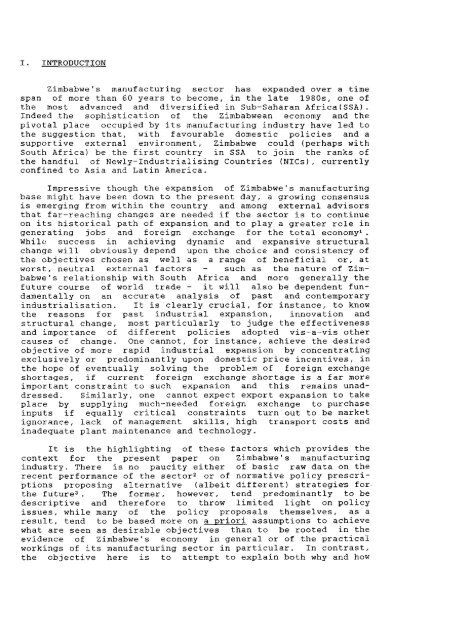Zimbabwe - Overseas Development Institute
Zimbabwe - Overseas Development Institute
Zimbabwe - Overseas Development Institute
You also want an ePaper? Increase the reach of your titles
YUMPU automatically turns print PDFs into web optimized ePapers that Google loves.
I. INTRODUCTION<br />
<strong>Zimbabwe</strong>'s manufacturing sector has expanded over a time<br />
span of more than 60 years to become, i n the l a t e 1980s, one of<br />
the most advanced and d i v e r s i f i e d i n Sub-Saharan A f r i c a ( S S A ) .<br />
Indeed the s o p h i s t i c a t i o n of the <strong>Zimbabwe</strong>an economy and the<br />
p i v o t a l place occupied by i t s manufacturing i n d u s t r y have l e d to<br />
the suggestion that, with favourable domestic p o l i c i e s and a<br />
supportive external environment, <strong>Zimbabwe</strong> could (perhaps with<br />
South A f r i c a ) be the f i r s t country i n SSA to j o i n the ran)cs of<br />
the handful of N e w l y - I n d u s t r i a l i s i n g Countries (NICs), c u r r e n t l y<br />
confined to Asia and L a t i n America.<br />
Impressive though the expansion of <strong>Zimbabwe</strong>'s manufacturing<br />
base might have been down to the present day, a growing consensus<br />
i s emerging from w i t h i n the country and among e x t e r n a l advisors<br />
that far-reaching changes are needed i f the sector i s to continue<br />
on i t s h i s t o r i c a l path of expansion and to play a greater r o l e i n<br />
generating jobs and f o r e i g n exchange f o r the t o t a l economy'.<br />
While success i n achieving dynamic and expansive s t r u c t u r a l<br />
change w i l l obviously depend upon the choice and consistency of<br />
the o b j e c t i v e s chosen as w e l l as a range of b e n e f i c i a l or, at<br />
worst, n e u t r a l external f a c t o r s - such as the nature of <strong>Zimbabwe</strong>'s<br />
r e l a t i o n s h i p with South A f r i c a and more g e n e r a l l y the<br />
future course of world trade - i t w i l l also be dependent fundamentally<br />
on an accurate a n a l y s i s of past and contemporary<br />
i n d u s t r i a l i s a t i o n . I t i s c l e a r l y c r u c i a l , f o r instance, to know<br />
the reasons f o r past i n d u s t r i a l expansion, innovation and<br />
s t r u c t u r a l change, most p a r t i c u l a r l y to judge the e f f e c t i v e n e s s<br />
and importance of d i f f e r e n t p o l i c i e s adopted v i s - a - v i s other<br />
causes of change. One cannot, for instance, achieve the desired<br />
o b j e c t i v e of more r a p i d i n d u s t r i a l expansion by concentrating<br />
e x c l u s i v e l y or predominantly upon domestic p r i c e i n c e n t i v e s , i n<br />
the hope of eventually s o l v i n g the problem of f o r e i g n exchange<br />
shortages, i f current f o r e i g n exchange shortage i s a f a r more<br />
important c o n s t r a i n t to such expansion and t h i s remains unaddressed.<br />
S i m i l a r l y , one cannot expect export expansion to take<br />
place by supplying much-needed f o r e i g n exchange to purchase<br />
inputs i f equally c r i t i c a l c o n s t r a i n t s turn out to be market<br />
ignorance, lack of management s k i l l s , high transport costs and<br />
inadequate plant maintenance and technology.<br />
I t i s the h i g h l i g h t i n g of these f a c t o r s which provides the<br />
context f o r the present paper on <strong>Zimbabwe</strong>'s manufacturing<br />
industry. There i s no paucity e i t h e r of basic raw data on the<br />
recent performance of the sector^ or of normative p o l i c y p r e s c r i <br />
ptions proposing a l t e r n a t i v e ( a l b e i t d i f f e r e n t ) s t r a t e g i e s for<br />
the future'. The former, however, tend predominantly to be<br />
d e s c r i p t i v e and therefore to throw l i m i t e d l i g h t on p o l i c y<br />
issues, while many of the p o l i c y proposals themselves, as a<br />
r e s u l t , tend to be based more on a p r i o r i assumptions to achieve<br />
what are seen as d e s i r a b l e o b j e c t i v e s than to be rooted i n the<br />
evidence of <strong>Zimbabwe</strong>'s economy i n general or of the p r a c t i c a l<br />
workings of i t s manufacturing sector i n p a r t i c u l a r . In contrast,<br />
the o b j e c t i v e here i s to attempt to e x p l a i n both why and how
















